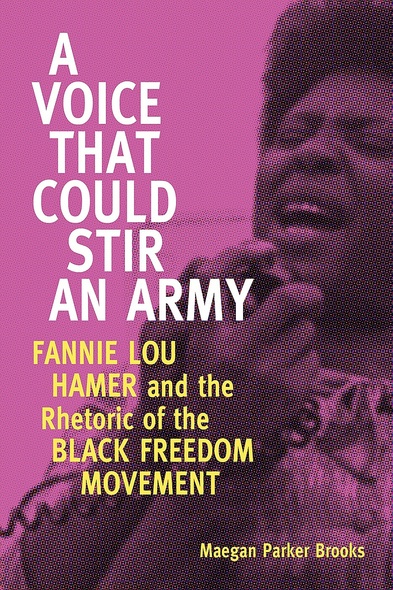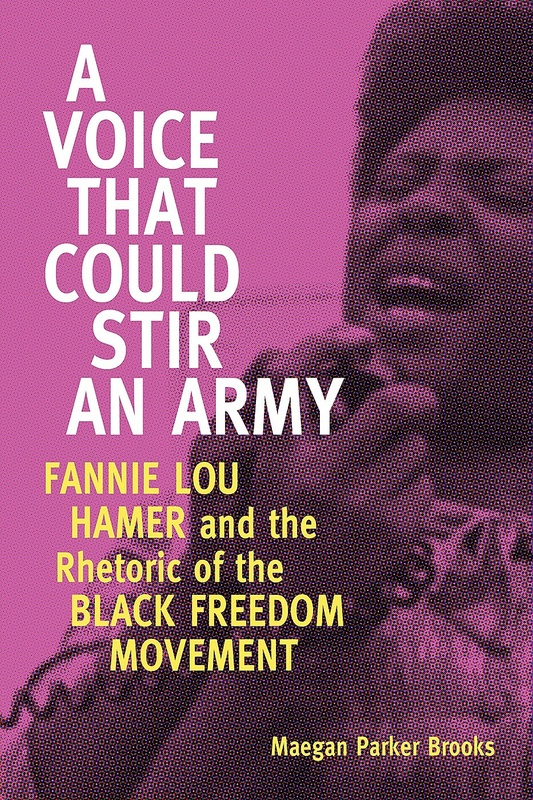
A Voice That Could Stir an Army
Fannie Lou Hamer and the Rhetoric of the Black Freedom Movement
A sharecropper, a warrior, and a truth-telling prophet, Fannie Lou Hamer (1917–1977) stands as a powerful symbol not only of the 1960s black freedom movement, but also of the enduring human struggle against oppression. A Voice That Could Stir an Army is a rhetorical biography that tells the story of Hamer’s life by focusing on how she employed symbols—images, words, and even material objects such as the ballot, food, and clothing—to construct persuasive public personae, to influence audiences, and to effect social change.
Drawing upon dozens of newly recovered Hamer texts and recent interviews with Hamer’s friends, family, and fellow activists, Maegan Parker Brooks moves chronologically through Hamer’s life. Brooks recounts Hamer’s early influences, her intersection with the black freedom movement, and her rise to prominence at the 1964 Democratic National Convention. Brooks also considers Hamer’s lesser-known contributions to the fight against poverty and to feminist politics before analyzing how Hamer is remembered posthumously. The book concludes by emphasizing what remains rhetorical about Hamer’s biography, using the 2012 statue and museum dedication in Hamer’s hometown of Ruleville, Mississippi, to examine the larger social, political, and historiographical implications of her legacy.
The sustained consideration of Hamer’s wide-ranging use of symbols and the reconstruction of her legacy provided within the pages of A Voice That Could Stir an Army enrich understanding of this key historical figure. This book also demonstrates how rhetorical analysis complements historical reconstruction to explain the dynamics of how social movements actually operate.
This is the best book on the famous civil rights activist Fannie Lou Hamer and one of the better books on the civil rights movement in general. A scholar of rhetoric, Brooks focuses closely on the content and context of Hamer’s public addresses, often employing the terminology of that discipline, which will particularly appeal to scholars in that field. Beyond that, however, Brooks and her collaborator, Davis Houck, who together coedited the 2011 compilation The Speeches of Fannie Lou Hamer, the single best primary source anthology available for studying the grassroots sharecropper activist turned warrior, provide a wealth of detailed local history and a close analysis of Hamer’s life. This includes the most extensive and perceptive coverage available of her early years prior to joining the movement as well as the struggles, tragedies, and difficulties of Hamer’s later years. In short, the work combines the best of archival research (and appropriate reference to the secondary historical literature on the freedom movement in Mississippi) and rhetorical analysis, ultimately successfully recovering ‘Hamer’s symbolic legacy by recovering her agency and intellect' and demonstrating how her iconic status ‘worked toward and against her activist purposes.' For all scholarly libraries.
Terming her study of Hamer a ‘rhetorical biography,' Brooks closely examines Hamer’s life in relation to her bracing song-leading and oratory. Writing with more thoroughness and accuracy than any other Hamer scholar, Brooks depicts a horrifying incident in which sadistic police in small-town Mississippi brutalized Hamer (and other organizers), injuring her for life. As Brooks explains, Hamer retaliated by repeatedly weaving the incident into her speeches, thereby risking her life yet again while exposing the raw violence that undergirded the frequently genteel surface of the white supremacist South . . . Brooks’s most important contribution may lie in her examination of Hamer’s final years. As Brooks astutely explains, Hamer spent her last decade battling persistent, invidious racism; the indifference of the news media; and the decline of her own health, a decline occasioned in part by injuries sustained from police torture in 1962 . . . We hope that this collection of Hamer’s orations and Brooks’s incisively written account will prod critical race theorists and whiteness theorists to discover Hamer for the first time. We also hope that these two books [The Speeches of Fannie Lou Hamer: To Tell It Like It Is and A Voice That Could Stir an Army: Fannie Lou Hamer and the Rhetoric of the Black Freedom Movement] will propel conscientious high school and college faculty to reform their pedagogy by showcasing Hamer and the Mississippi Freedom Democratic Party in their curricula. Inspired and informed by Hamer, our students might then increase their capacity to grasp the unfortunate state of race relations in Ferguson, Missouri, and elsewhere and to contemplate solutions.
[A] brilliantly conceived book that runs against the grain of normative civil rights narratives that, in the author’s view, de-emphasize the direct-action politics and the prophetic rhetoric of activists such as Hamer. Brooks feels—and demonstrates the premise admirably—that bottom-up approaches to social change, of which Hamer is emblematic, deserve more regard.
Maegan Parker Brooks’s recent volume on Fannie Lou Hamer’s rhetorical life is a significant and welcome contribution to several historiographies, including Hamer biographies, the black freedom movement, and the rhetorical strategies of African American speakers. . . . Perhaps this book’s finest contributions are its deep evaluation of Hamer’s speeches and its convincing argument that Hamer was a shrewd strategist and gifted speaker who was in control of her message and willing to evolve with changing contexts. While Hamer’s rise to prominence is sometimes understood as the confluence of the right voice emerging in the right location at the right time, Brooks accurately asserts that Hamer’s initial and continuing success was as much due to her intellect and rhetorical strategy as it was to fortunate coincidence. Brooks skillfully uses rhetorical analysis to build a case for Hamer’s development as a speaker and public persona. . . . Ultimately, Brooks does a masterful job of exploring the complexities of Hamer’s work and expresses some valid concerns about the way Hamer has been selectively remembered and memorialized in the decades since her passing . . . Though Hamer has often been seen as an authentic voice who simply entered the struggle at the right moment, Brooks adeptly shows that Hamer was as intelligent, thoughtful, and strategic as any of her more celebrated peers.
A long overdue book on the life of Fannie Lou Hamer that shows the full legacy of her work. Maegan Parker Brooks has done a splendid job of showing that Hamer was involved and made an imprint on all social issues, from civil rights, economic justice, and feminist issues to racial justice. As stated by many in the book, Fannie Lou Hamer was a warrior, who is on the Mount Rushmore of human rights leaders. A very timely book as the issues Hamer worked on continue to exist.
This is a deft, bold, subtle book that moves through an intensely complicated history with confidence and clarity, and it brings to the page the actual woman whose brilliance and courage we cannot know in the flesh. I am now a big fan of Hamer.
Maegan Parker Brooks’s A Voice That Could Stir an Army: Fannie Lou Hamer and the Rhetoric of the Black Freedom Movement is a meticulously researched and thoughtfully argued contribution to [black freedom movement] literature that foregrounds the lived conditions that motivate and shape this discursive tradition . . . in the book’s deft analysis of texts and history, Hamer’s life and her speeches emerge as a mediator of politics and principles, individual pain and the concerns of community. In so doing, this book crafts an understanding of Hamer that can serve not only as an exemplar of individual courage but also as acknowledgment of and a goad to collective responsibility for social change . . . Brooks analyzes a complex weave of public speeches, archival sources, historical accounts, and interviews to appreciate and understand the development of a seminal voice in the rhetoric of social change in the United States. This work is a major accomplishment and a substantial contribution to the literatures of black civil rights rhetoric and rhetorical studies more generally.
Brooks in A Voice That Could Stir an Army shows us rather brilliantly how rhetoric functions in all of its situated complexity—how Fannie Lou Hamer used the spoken word for persuasive ends, but for the manifold ways that rhetoric functioned to transform her, her listeners, and the nation’s understandings of itself. In so doing we get a historically compelling and rhetorically grounded set of arguments that stands a lot of conventional thinking on its head and furthers our understanding of the civil rights movement as principally a rhetorical phenomenon. . . . In so doing she provides scholars of many disciplinary stripes with her own rhetorically compelling case study in rhetorical biography.
Maegan Parker Brooks’s command of information and passion vividly brings to life one of the great orators and civil rights leaders of all time, leaving the reader with only one question, ‘Why is Fannie Lou Hamer obscure in American history books?' Brooks provides the bridge from Hamer’s little-known life to the commanding and brilliant voice of Mississippi that stirred Freedom Summer. Her candid and genuine approach to the spirit and life of Hamer demonstrates that she most definitely has Hamer in her bones!
Maegan Parker Brooks’s rhetorical biography of Fannie Lou Hamer does justice to one of the twentieth-century freedom struggle’s most important grassroots leaders. Brooks tells a compelling story well, bringing Hamer’s voice to life in the context of her home community and the shifting ground of the 1960s civil rights movement. Thoughtful, well-written, and grounded in extensive research, specialists and newcomers alike will enjoy and learn from this compelling book.
Maegan Parker Brooks has captured the life and spirit of Fannie Lou Hamer, a strong, self-made, home-schooled black woman poised to step forward, ready to share the pain and shame of the slave life, the plantation life she and her family lived and knew so well. Yet, because of her faith and God-fearing way of life, she found the capacity to love her oppressors, because God loved them. Brooks’s new book will bring to life the essence of grassroots participation and leadership in Mississippi by Hamer and the many she inspired.
Maegan Parker Brooks is a member of the National Fannie Lou Hamer Statue and Education Fund Committee. She is lead researcher on a documentary about Hamer; author of A Voice That Could Stir an Army: Fannie Lou Hamer and the Rhetoric of the Black Freedom Movement; and coeditor,with Davis W. Houck, of The Speeches of Fannie Lou Hamer: To Tell It Like It Is, bothpublished by University Press of Mississippi.




